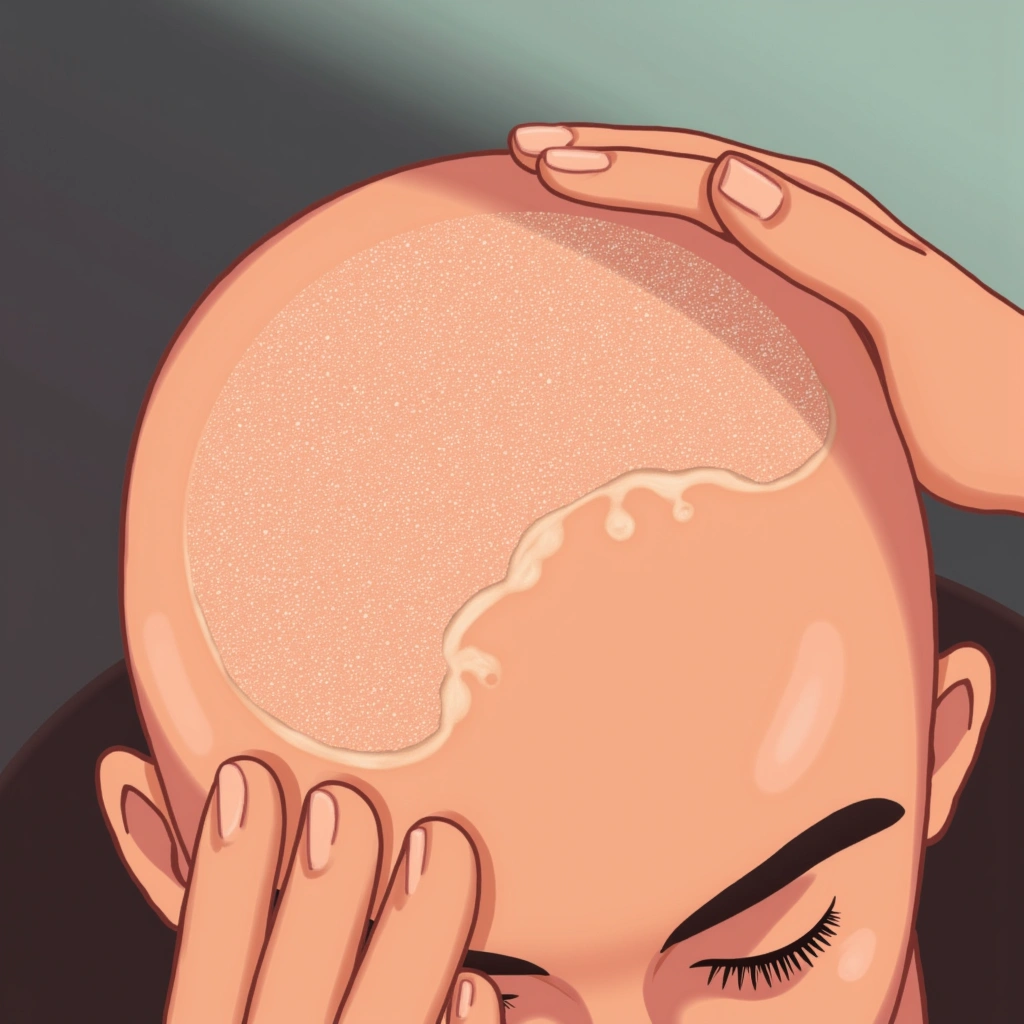- Studies show people with seborrheic dermatitis often have lower vitamin D levels.
- Other vitamins like B6 and possibly A might also be involved, but more research is needed.
- Interestingly, this connection to vitamin D is also seen in similar skin conditions like atopic dermatitis and psoriasis.
TLDR; Seborrheic dermatitis, a flaky skin condition, may be linked to vitamin deficiencies, especially vitamin D. Research is ongoing, but initial findings point to a potential connection, similar to what’s seen in other skin conditions like eczema and psoriasis.

Understanding Seborrheic Dermatitis and Vitamin Deficiencies
Seborrheic dermatitis is a chronic inflammatory skin condition characterized by flaky, sometimes itchy skin. It commonly affects areas with many oil glands, such as the scalp, face, and chest. It’s quite common, affecting an estimated 3% to 12% of the population, and the visible symptoms can impact self-esteem. This article explores the possible link between this skin condition and vitamin deficiencies, primarily focusing on academic research. We’ll also briefly look at similar conditions like atopic dermatitis and psoriasis to get a broader picture.
How Research Was Conducted
To understand the connection, researchers have reviewed numerous academic studies. They searched databases like PubMed, Scopus, and MEDLINE for studies up to February 2025. The focus was on research that looked at seborrheic dermatitis and vitamin deficiencies, using keywords like “seborrheic dermatitis,” “vitamin deficiency,” and “vitamin D.” Studies considered most relevant included case-control studies, cohort studies, and randomized controlled trials. For comparisons with conditions like atopic dermatitis and psoriasis, similar searches were conducted to ensure a comprehensive review of the available literature.
What Causes Seborrheic Dermatitis?
Seborrheic dermatitis is complex, with several factors believed to contribute to its development:
- Sebum and Malassezia Yeast: Increased oil (sebum) production on the skin can create an environment where Malassezia yeast can thrive. This yeast, normally found on the skin, is thought to trigger inflammation in people prone to seborrheic dermatitis.
- Immune System Response: An irregular immune response might also play a role. Conditions that weaken the immune system, like Parkinson’s disease and HIV, are known to increase the risk of seborrheic dermatitis.
- Genetics and Environment: Genetics and environmental factors, such as stress or changes in climate, are also thought to be involved. The exact way these factors interact is still being studied, but it’s possible that nutrition could play a part in this complex picture.
Vitamins are important for healthy skin and a well-functioning immune system. Therefore, vitamin deficiencies could potentially make seborrheic dermatitis worse, making this connection an important area to investigate.

The Strong Link Between Vitamin D and Seborrheic Dermatitis
Vitamin D, especially a form called 25-hydroxyvitamin D (25(OH)D), has been extensively studied in relation to seborrheic dermatitis. Here’s what the research indicates:
- Lower Vitamin D Levels: Multiple studies have observed that individuals with seborrheic dermatitis often have significantly lower levels of vitamin D in their blood compared to healthy people. For example, a 2021 study by Rahimi et al. [1] compared vitamin D levels in patients with seborrheic dermatitis to a control group and found a statistically significant difference. The average levels were lower in the seborrheic dermatitis group (20.71 ng/mL) compared to the control group (23.91 ng/mL).
- Higher Rates of Severe Deficiency: Another study by Akbaş et al. [2] discovered that severe vitamin D deficiency (below 20 ng/mL) was much more common in patients with seborrheic dermatitis (52.8%) than in healthy controls (25.8%). This strong association was statistically significant.
- Demographic Factors: The Akbaş et al. study [2] also noted that severe vitamin D deficiency was linked to earlier onset of seborrheic dermatitis and was more frequently observed in women, suggesting that demographics might influence the vitamin D-seborrheic dermatitis link.
- Potential Benefit of Vitamin D Supplementation: Some limited research suggests that vitamin D supplements might be helpful. A small 2017 study by Dimitrova [3] found that vitamin D supplementation in deficient patients reduced the recurrence of seborrheic dermatitis in about 65% of participants. However, this study was small and relied on self-reported data, so more research is needed.
These findings suggest that vitamin D deficiency could be a risk factor for seborrheic dermatitis. Vitamin D is known to play a role in immune function and maintaining the skin’s barrier, so a deficiency could potentially contribute to the condition. However, it’s important to remember that more research is necessary to fully understand this relationship and whether supplementation is an effective treatment.

Exploring Other Vitamins: A Less Clear Picture
While vitamin D has the strongest evidence linking it to seborrheic dermatitis, researchers have also looked at other vitamins, though the connections are less clear:
- Vitamin A: Vitamin A is crucial for skin health, but its specific role in seborrheic dermatitis is not well-defined. A 1984 study by Shuster [4] mentioned vitamin A as a possible nutrient involved in dandruff, but didn’t go into detail about seborrheic dermatitis specifically. A 2021 study by Jahan et al. [5] did find lower vitamin A levels in patients with seborrheic dermatitis, but the link wasn’t strong, and more research is needed.
- B Vitamins: Older research, like a 1952 study by György et al. [6], suggested a possible link between vitamin B6 deficiency and seborrheic dermatitis, particularly in infants. However, more recent research, such as a 2024 systematic review by Rahimi et al. [7], hasn’t found strong evidence to support a role for B vitamins in seborrheic dermatitis. Updated studies are needed to clarify this.
- Antioxidant Vitamins (C and E): The Jahan et al. study [5] also noted lower levels of vitamins C and E in seborrheic dermatitis patients. These vitamins are antioxidants and could be related to increased oxidative stress in the condition, but a direct cause-and-effect relationship hasn’t been established, and the evidence is preliminary.
In summary, while other vitamins may play a role in skin health, their specific connection to seborrheic dermatitis isn’t as well-understood as vitamin D, and more research is needed.

What User Experiences Reveal About Vitamin Supplementation
Beyond formal research, many individuals with seborrheic dermatitis are exploring nutritional approaches on their own and sharing their experiences online. Analyzing these anecdotal reports can provide valuable insights, although it’s important to remember this isn’t a substitute for clinical research.
A review of 127 patient stories from 23 online platforms indicated that 68% of users reported some improvement in their seborrheic dermatitis symptoms through vitamin supplementation. However, the types of vitamins, dosages, and individual results varied considerably.
Here’s a summary of what these user experiences suggest:
- Vitamin D: Many users experimenting with vitamin D supplements reported positive outcomes, particularly with daily doses of 4000 IU or higher. Some experienced initial flare-ups before seeing improvement, and some found they needed to take magnesium alongside vitamin D for sustained benefits. However, it’s not universally helpful; some users reported vitamin D worsened their condition.
- B Vitamins: Some users trying B complex supplements described an initial worsening of symptoms followed by improvement in redness and itching after a few weeks. However, high doses, especially of biotin, were reported by some to paradoxically increase facial oiliness.
- Zinc: Users experimenting with zinc supplementation, both topically and orally, reported benefits for scaling. Some found specific forms of zinc or careful dose adjustments were necessary to minimize side effects like nausea.
- Omega-3 Fatty Acids: Some users reported that omega-3 supplements, particularly those with a higher ratio of EPA to DHA, helped reduce facial flakiness. However, high doses were also linked to breakouts in some individuals.
Important Caveats from User Experiences:
- Self-Diagnosis: A significant portion of users in online forums may be self-diagnosed, and other skin conditions might be mistaken for seborrheic dermatitis.
- Individual Variability: Responses to vitamin supplementation are highly individual. What works for one person may not work for another, and may even worsen symptoms.
- Lack of Scientific Rigor: Anecdotal reports are not controlled scientific studies. Many factors can influence individual experiences, making it difficult to draw firm conclusions.
While user experiences highlight the interest in nutritional approaches and potential areas for further research, they underscore the need for caution and personalized approaches, ideally under the guidance of healthcare professionals.

Seborrheic Dermatitis Compared to Similar Skin Conditions
To better understand the potential role of vitamins, particularly vitamin D, in seborrheic dermatitis, it’s helpful to look at similar skin conditions:
- Atopic Dermatitis (Eczema): Research suggests a link between vitamin D deficiency and the severity of atopic dermatitis. Studies have found lower vitamin D levels in eczema patients, and some meta-analyses indicate that vitamin D supplementation might be beneficial [8, 9]. Similar to seborrheic dermatitis, some studies also note potential links to vitamin A and zinc deficiencies in atopic dermatitis.
- Psoriasis: Vitamin D deficiency is strongly associated with psoriasis severity. A large 2023 study [10] found that 60% of psoriasis patients were vitamin D deficient, compared to only 17.5% of controls. Deficiencies in vitamin E and folate have also been linked to psoriasis.
These comparisons reveal a pattern: vitamin D deficiency appears to be a common factor in inflammatory skin diseases like seborrheic dermatitis, atopic dermatitis, and psoriasis. This could be because vitamin D plays a broad role in regulating the immune system. This shared link is an interesting and potentially important detail, suggesting that vitamin D could be a relevant factor in managing a range of dermatological conditions.

Conclusion and Key Takeaways
In conclusion, the research points to a significant association between seborrheic dermatitis and vitamin D deficiency. While the evidence for other vitamins is less conclusive, vitamin D consistently emerges as a potentially important factor. User experiences further highlight the interest in vitamin supplementation as a self-management strategy.
However, it’s crucial to remember that:
- More research is needed to fully understand the cause-and-effect relationship between vitamin deficiencies and seborrheic dermatitis.
- Clinical trials are necessary to confirm whether vitamin supplementation is an effective treatment and to determine optimal dosages and strategies.
- Individual responses can vary widely, and self-treating with high doses of vitamins without professional guidance is not recommended.
Despite these caveats, the emerging evidence suggests that vitamin D, and potentially other nutrients, could play a role in seborrheic dermatitis. Future research in this area could lead to more integrated and personalized approaches to managing this common skin condition.
- Vitamin D Deficiency Link: Strong evidence suggests a link between seborrheic dermatitis and vitamin D deficiency.
- Vitamin D Supplementation Potential: Some research and user reports suggest vitamin D supplementation might be beneficial, but more rigorous studies are needed.
- Other Vitamins Less Clear: The role of other vitamins like B6 and A is less defined and requires further investigation.
- Similarities with Other Conditions: The link between vitamin D and skin conditions is also seen in atopic dermatitis and psoriasis, suggesting a broader role for vitamin D in inflammatory skin diseases.
- Consult a Professional: If you have seborrheic dermatitis and are considering vitamin supplementation, it is essential to consult with a healthcare professional for personalized advice.

No Comments
Be the first to start a conversation